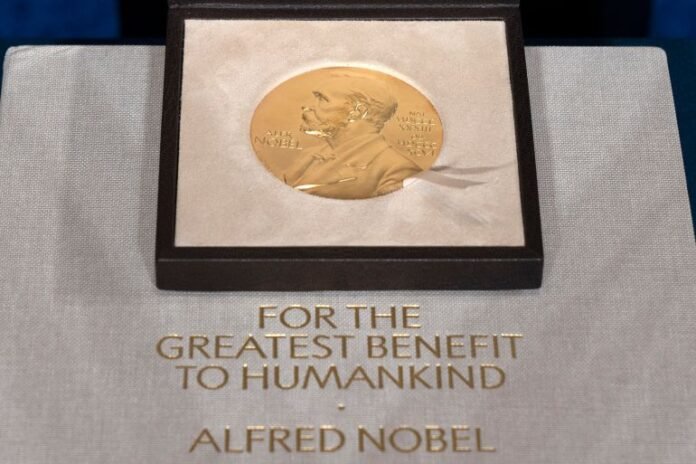Nobel Prize 2025: What they are, when will the awards be announced?
Nobel Prize for medicine to be announced on Monday, followed by five other prizes to be declared over the next week.

 Published On 6 Oct 20256 Oct 2025
Published On 6 Oct 20256 Oct 2025
Save
The Nobel Prize 2025 officially kicks off with the first award, for physiology or medicine, to be announced on Monday, setting the stage for a week of global anticipation.
The full schedule, spanning from October 6 to 13, maps out a rapid succession of announcements: medicine, followed by physics, chemistry, literature, peace, and finally culminating with the economics prize next Monday.
Here are the complete details of the schedule – and what to expect from this year’s Nobel Prizes.
What is the Nobel Prize?
The Nobel Prize is a set of the most prestigious international awards established by the will of Alfred Nobel, a Swedish chemist, engineer, and industrialist best known for discovering dynamite.
In his 1895 will, Nobel left the bulk of his fortune to fund annual prizes recognising those who “have conferred the greatest benefit to humankind” in the preceding year.
The first Nobel Prizes were awarded in 1901 for outstanding achievement in the fields of physics, chemistry, medicine, literature, and peace.
In 1968, Sweden’s central bank, Sveriges Riksbank, established the Prize in Economic Sciences in Memory of Alfred Nobel, expanding the categories to six.

Who awards the Nobel Prizes, and how much is the prize money?
The prizes are awarded by different institutions: the Royal Swedish Academy of Sciences (for physics, chemistry, and economics), the Nobel Assembly at the Karolinska Institutet (for medicine), the Swedish Academy (for literature), and the Norwegian Nobel Committee (for peace).
Advertisement
Each laureate receives a gold medal, a diploma, and a cash award funded by the Nobel Foundation, which manages Nobel’s endowment. This year’s prize amounts to 11 million Swedish kronor ($1.2m), and a shot at overnight fame for the recipients.
The prizes are formally presented on December 10, the anniversary of Nobel’s death in 1896.

What is this year’s Nobel Prizes schedule?
The announcements will start on Monday, October 6, and will end a week later, on October 13.
Monday, October 6: Physiology or medicine
Announced by the Nobel Assembly at Karolinska Institutet, Wallenbergsalen, Nobel Forum, Solna, near Stockholm.
Tuesday, October 7: Physics
Announced by the Royal Swedish Academy of Sciences, Stockholm.
Wednesday, October 8: Chemistry
Announced by the Royal Swedish Academy of Sciences, Stockholm.
Thursday, October 9: Literature
Announced by the Swedish Academy, Stockholm.
Friday, October 10: Peace
Announced at the Norwegian Nobel Institute by the Chair of the Norwegian Nobel Committee.
Monday, October 13: The Sveriges Riksbank Prize in Economic Sciences in Memory of Alfred Nobel
Announced by the Royal Swedish Academy of Sciences, Stockholm.

What is expected to dominate this year’s prizes?
Research into hormones that regulate appetite is leading speculation for this year’s Nobel Prize in medicine.
With more than a billion people worldwide affected by obesity, scientists behind the discovery of the hormone glucagon-like peptide 1 (GLP-1) are seen as frontrunners. Their work paved the way for a new class of antiobesity and diabetes drugs, including Ozempic, Wegovy, and Mounjaro, which have transformed global treatment approaches.
Experts say the likely honourees could include Jens Juul Holst, Joel Habener, Daniel Drucker, and Svetlana Mojsov, who were central to GLP-1’s discovery and development in the 1980s. Others point to Japanese researchers Kenji Kangawa and Masayasu Kojima for their work on ghrelin, a hormone that stimulates appetite, potentially forming a scientific “bookend” to earlier breakthroughs like the discovery of leptin in 1994.
Beyond medicine, there are some popular physics contenders, with experts citing breakthroughs in metamaterials, including British physicist John Pendry’s work on the so-called “invisibility cloak”, a method for redirecting electromagnetic fields around objects.
Advertisement
Why is the Nobel Peace Prize being watched closely this year?
The world is fraught with conflict, including an ongoing genocide in Gaza and mounting humanitarian crises in Ukraine, with civil wars and political repression in several countries.
However, the headlines and debates about this year’s Nobel Peace Prize are rather outsized and focused on United States President Donald Trump, for his relentless self-promotion — at times, claiming to deserve it for “ending seven wars”.
At the United Nations, Trump told delegates that “everyone says that I should get the Nobel Peace Prize”. On September 30, Trump reiterated that he “deserved” to win the prize for the possibility of ending an eighth war, given that Israel ended its two-year-long war in Gaza.
However, experts have noted that his chances are slim. The Norwegian Nobel Committee typically focuses on the durability of peace, the promotion of international fraternity, and the quiet work of institutions that strengthen those goals, experts have argued.
This year’s nominations for Trump include Israeli Prime Minister Benjamin Netanyahu and Pakistan’s government, though both were made after the deadline for the 2025 award.
One of the Nobel awarding bodies has also warned that academic freedom is under threat from the political interference by the Trump administration.
Ylva Engstrom, vice president of the Royal Swedish Academy of Sciences, which awards the prizes for chemistry, physics and economics, said the Trump administration’s changes were reckless. ‘PILLAR OF DEMOCRATIC SYSTEM’ “I think in both the short and long term, it can have devastating effects,” she told the Reuters news agency in an interview. “Academic freedom … is one of the pillars of the democratic system.”
However, Engstrom is not herself on any of the three committees that will award the prizes for chemistry, physics, or economics.

What happens at the Nobel Prize ceremony?
Annually, on December 10, the anniversary of Nobel’s death, the Nobel Prizes are formally awarded in twin ceremonies held in Stockholm and Oslo.
The Stockholm ceremony is attended by Sweden’s royal family, where laureates in physics, chemistry, medicine, literature, and economic sciences receive their medals and diplomas from the king of Sweden.
In Oslo, the Nobel Peace Prize is presented by the chair of the Norwegian Nobel Committee at the Oslo City Hall, honouring Nobel’s wish that the peace prize be awarded in Norway.
Laureates are individually called to the stage, where they receive the Nobel medal, diploma, and the monetary award. The ceremony also features speeches by committee chairs highlighting the significance of their discoveries or contributions.
The event is broadcast worldwide and followed by a lavish Nobel Banquet at Stockholm’s City Hall for more than 1,000 guests, including royal members, diplomats, scientists, and past laureates.
Advertisement
Who won these prizes last year?
Victor Ambros and Gary Ruvkun were awarded the 2024 prize for medicine for discovering microRNAs – tiny RNA molecules that regulate gene expression after transcription.
In physics, John J Hopfield and Geoffrey E Hinton received the prize for pioneering research that laid the theoretical and computational foundations of modern machine learning and artificial neural networks. While Hopfield’s models in the 1980s linked neuroscience and computation, Hinton’s work revolutionised deep learning, enabling advances in image recognition, natural language processing, and artificial intelligence (AI) systems.
In chemistry, the prize was shared by David Baker, Demis Hassabis, and John M Jumper for breakthroughs in predicting and designing protein structures using computational models. Baker was honoured for developing algorithms that enable scientists to design new proteins with specific functions, while Hassabis and Jumper, from Google’s DeepMind, were recognised for creating AlphaFold, the AI system that predicted nearly all known protein structures with unprecedented accuracy.
In the literature category, the prize went to Han Kang, a South Korean novelist known for her haunting explorations of violence, identity, and collective memory. Best known internationally for novels The Vegetarian and Human Acts, Han was cited “for her intense poetic prose that confronts historical traumas and exposes the fragility of human life”.
In the peace category, the prize was awarded to Nihon Hidankyo, the Japan Confederation of A- and H-Bomb Sufferers Organisations, honouring its decades-long campaign to abolish nuclear weapons and preserve the testimony of Hiroshima and Nagasaki survivors.
In economic sciences, Daron Acemoglu, Simon Johnson, and James A Robinson shared the prize for their analysis of how institutions shape long-term economic growth and inequality. Their collaborative research, including the seminal work Why Nations Fail, demonstrated that inclusive political and economic institutions, rather than geography or culture, determine prosperity.






